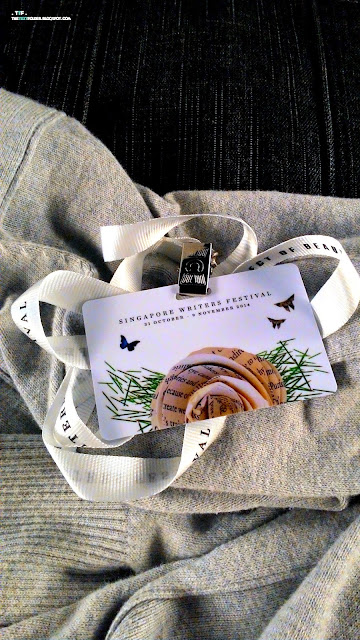The Singapore Series: Singapore Writers Festival 2014 - This year I go behind the scenes
The Singapore Writers Festival (SWF) is back
and the 2014 installment spans a little over one week, from 31 October to 9
November. This time the festival is bigger, with over 150 Festival Pass events
for Festival Pass holders. There are of course the usual (but not limited to)
literary walks*, meals with authors*, publishing symposium*, workshops*,
lectures by big names*, free performances, book launches, the “Little Lit”
programme for the young, and the Fringe Festival held at The Arts House.
*These programmes are not covered by the
Festival Pass. Tickets are sold separately.
However, the festival this year takes on a
different tone for me. Last year, I attended as a paying customer, a participant
who is free to do whatever I want and to attend whichever programme I see fit.
This year though, I volunteered for the festival. It is my way of helping and
contributing what I can to the local literature scene and also to put my nose
into where it usually does not get access.
 |
| SWF Volunteer Pass. |
I am most happy to report that my experience as
a SWF volunteer is eye opening. I mean, the SWF is after all, a coming together
of like-minded individuals, bent in their passion of either reading or writing
(or both). Therefore, chances are, most of the volunteers are book lovers as
well, so I really have no problems socializing there, no matter how inept I am
at small talk. The only (it really is the
only) downside is that as a volunteer, you cannot choose which programme to
help out at. Hence you would be missing out on panels and talks that you would
be interested to attend. However, as every dark cloud has a silver lining, the advantage
to this is that you would be exposed to topics and writers that you normally
would not have thought of reading about.
Since I am stationed at the Festival Pavilion
for one of the days, I now know that there is an organization (the Poetry Proletariat Factory) that goes around crafting poems on the spot,
on old-fashion typewriters no less! All you need to do is to give them a name
(whomever you want the poem addressed to) and a single word, and wallah, your poem will be out of the factory
in no time. The concept is beguiling. Waiting for your poem to be produced is
exciting, if not a little fretful, as you are so eager to know how that one
word could be transformed into an art form.
 |
| The Poetry Proletariat Factory. |
 |
| The volunteer poets at work. |
Since I was on duty there, I
submitted a word - “doldrums”. This is the poem I got:
 |
| My favourite line? "revolutionary doldrums" |
What do you think of the poem? Not bad I would say
(by a non-poet and reader of very little poetry).
My role as a volunteer is Front-of-House, you
know, the kind helpful souls that stand at entrances to check for Festival Passes/tickets
and to usher you in. They are the people who answer all your questions and point
you to the right direction. They are also your lifesavers whenever you need a
toilet urgently but have no idea as to its location.
I really enjoyed myself while volunteering. I
guessed that I am lucky to be partnered with friendly volunteers. Although there are many who have volunteered
before, they do not put up airs. They sincerely want to help to make the
event a success. During downtime, they share stories from their previous experiences.
The organisers (from National Arts Council - NAC), or those that I’ve met anyway,
are great people. They
are all hardworking people with the aim of making the experience wonderful for festivalgoers. Sure there were some slip-ups, like last minute changes that were not reflected in the festival booklet (i.e., change of locations for some programmes), but volunteers are all equipped with the information to let participants know of the change. The website is also updated as well.
The good thing about being a volunteer is that
you get a peek at the inner workings of organising a festival. It is very different from being a participant. You see all the
effort that goes into the planning and execution. Although I only see but a
tiny part of it, it is enough to convince me that the team invested a lot of
energy into making the event a success. And a success it is!
Overall I enjoyed my stint as a SWF volunteer.
The only downside as I’ve mentioned is that when on duty you will not be able
to choose which programmes you will be assigned to. Ultimately it is not a huge
problem. So if you’re interested to volunteer, keep your eyes open at either
the NAC or SWF websites.


Comments
Post a Comment